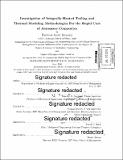Investigation of integrally-heated tooling and thermal modeling methodologies for the rapid cure of aerospace composites
Author(s)
Bromley, Harrison Scott
DownloadFull printable version (9.288Mb)
Other Contributors
Leaders for Global Operations Program.
Advisor
Timothy G. Gutowski and Thomas Roemer.
Terms of use
Metadata
Show full item recordAbstract
Carbon Fiber Reinforced Polymer (CFRP) composite manufacturing requires the CFRP part on the associated tool to be heated, cured, and cooled via a prescribed thermal profile. Current methods use large fixed structures such as ovens and autoclaves to perform this process step; however heating these large structures takes significant amounts of energy and time. Further, these methods cannot control for different thermal requirements across a more complex or integrated composite structure. This project focused on the below objectives and approaches: - Gather baseline energy and performance data on ovens and autoclaves to compare with estimations of new technologies; - Determine feasibility, applicability, and preliminary thermal performance of proposed heated tooling technologies on certain part families via heat transfer analyses. The project yielded the below results and conclusions: - Proved the capability of the modeling software to mimic an oven cure with less than 3% error in maximum exothermic temperature prediction; - Provided guidelines on when to use 1D, 2D, and 3D heat transfer analyses based on part thickness; - Concluded which size/shape of parts would work best for the single sided integral heating technologies; - Calculated energy intensity of incumbent technologies for comparison of future experiments on integrally heated tooling. Overall, this project helped steer the team into the next phase of their research of the technology and its applications. It provided recommendations on what type of parts the technology can be used as well as quantified the energy intensity of incumbents for comparison.
Description
Thesis: S.M., Massachusetts Institute of Technology, Department of Mechanical Engineering, 2015. In conjunction with the Leaders for Global Operations Program at MIT. Thesis: M.B.A., Massachusetts Institute of Technology, Sloan School of Management, 2015. In conjunction with the Leaders for Global Operations Program at MIT. Cataloged from PDF version of thesis. Includes bibliographical references (pages 102-106).
Date issued
2015Department
Leaders for Global Operations Program at MIT; Massachusetts Institute of Technology. Department of Mechanical Engineering; Sloan School of ManagementPublisher
Massachusetts Institute of Technology
Keywords
Mechanical Engineering., Sloan School of Management., Leaders for Global Operations Program.